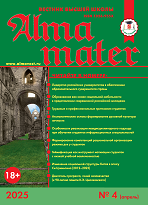UDC 37.01
https://doi.org/10.20339/AM.10-21.030
A.K. Mynbayeva is Dr. Sci. (Pedagogy), Prof. of Department of General and Applied Psychology e-mail: umo200709@mail.ru, and N.A. Assilbek is Senior Lecturer e-mail: nurtang.assilbek@mail.ru. Both at Al-Farabi Kazakh National University, Kazakhstan
Researched is the new in theory of education, i.e. heutagogy as a theory of self-education in a digital and knowledge society complements classical pedagogy and andragogy. Heutagogy is becoming one of the sciences of distance education. How do students of postgraduate education-master and PhD courses assess their potential for self-development and the foundations of heutagogics? The purpose of the article is to analyze and generalize the foundations of heutagogy as a theory of self-determination and self-education in the digital era, as well as to assess the principles of heutagogy by Kazakhstani master and doctoral students for their further self-development. In the article the continuity of the development of “Pedagogy – Andragogy – Heutagogy” (PAH) is reflected, the principle of PAH-continuum is substantiated, the strengths and weaknesses of the use of heutagogics in education are identified. Since a synergetic approach is more studied and applied in the domestic tradition, it can enrich the heutagogic foundations of modern education. In the practical part of the study, a questionnaire survey of 125 master’s and doctoral students of Kazakhstan was carried out in the 2020/2021 academic year. According to the self-assessment of the respondents, 78.4% of students are constantly engaged in self-development, and 20% — are unsystematic. Most of the students in the sample approve of the four principles of heutagogy, but some undergraduates and doctoral students dispute or suggest improving them. Thanks to the application of the heutagogic approach, a person can increase his intellectual potential throughout his life.
Key words: heutagogy, self-education, andragogy, synergetics, postgraduate education, distance learning, questionnaire.
References
- Sidhi Menon, U., Unni, M.V. The Paradigm Shift in the Indian Education System during COVID19: Impact, Opportunities and Trends — 2020. International Journal of Research in Engineering. 2020. DOI: https://doi.org/10.31033/ijemr.10.4.1
- Vasyukov, O.G. Distance learning: pros and cons. Alma mater (Vestnik vysshei shkoly). 2021. No. 2. P. 12–16. URL: https://doi.org/10.20339/AM.02-21.012 (In Russ.).
- Zakharova, E.M., Bernikova, S.M. Comparative analysis of distance and full-time forms of education at the University. Alma mater (Vestnik vysshei shkoly). 2021. No. 7. P. 36–42. URL: https://doi.org/10.20339/AM.07-21.036 (In Russ.).
- Beetham, H., and Sharpe, R. (Eds.). Rethinking pedagogy for a digital age: Designing for 21st century learning (Vol. 711). New York, NY: Routledge, 2013.
- Bespalko, V. P. (2016) Cyber-pedagogics is the call of the 21st century. Public education. No. 7-8. (In Russ.).
- Blaschke, L.M. Heutagogy and lifelong learning: A review of heutagogical practice and self-determined learning. International Review of Research in Open and Distance Learning. 2012. Vol. 13. No. 1. P. 56–71.
- Halupa, C.M. Pedagogy, Andragogy, and Heutagogy. Transformative Curriculum Design in Health Sciences Education. IGI Global, 2015. P. 143–158.
- Hase, S. Heutagogy and e-learning in the workplace: Some challenges and opportunities. Impact: Journal of Applied Research in Workplace E-learning. 2009. No. (1). P. 43–52. DOI: 10.5043/impact.13
- McAuliffe M. et al. Does pedagogy still rule? Australasian Journal of Engineering Education. 2009. Vol. 15. No. 1. P. 13–18.
- Blaschke, L.M. Self-determined learning: Designing for heutagogic learning environments. In: Learning, design, and technology: An international compendium of theory, research, practice, and policy Cham: Springer International Publishing. 2020. DOI: 10.1007/978-3-319-17727-4_62-1
- Agonács, N., Matos, J.F. Heutagogy and selfdetermined learning: a review of the published literature on the application and implementation of the theory, Open Learning. The Journal of Open, Distance and e-Learning. 2019. DOI: 10.1080/02680513.2018.1562329
- Luckin, R., Clark,W., Garnett, F., Whitworth, A., Akass, J., Cook, J., Robertson, J. Learner-generated contexts: A framework to support the effective use of technology to support learning. In: Web 2.0-based e-learning: Applying social informatics for tertiary teaching. Hershey, PA, USA: IGI Global, 2010. Р. 70–84. URL: http://knowledgeillusion.files.wordpress.com/ 2012/03/bookchapterluckin2009learnergeneratedcontexts.pdf
- Shemanaeva, M.A. PAH-continuum: from learning to learning and autonomy. Scientific-methodical electronic journal Concept. 2016. No. S19. URL: http://e-koncept.ru/2016/76222.htm (In Russ.).
- Spankulova, L.S. Diffusion of innovations and knowledge flows in the regions of Kazakhstan: monograph. Almaty, 2020. 233 p. (In Russ.).
- Sargsyan, A.S. Principles and features of the development of heutagogy as a field of pedagogical science. Man and education. 2014. No. 3 (40). (In Russ.).
- Ignatovich, E.V. Hyutagogy as a foreign concept of independent learning. Continuous education:21st century. 2013. No. 3. (In Russ.).
- Mynbayeva, A.K. Review of the latest theories of education; pedagogy 2.0, education 3.0 and hutagogy (heutagogy). Bulletin of Al-Farabi Kazakh National University. Series of pedagogical sciences. 2019. No. 4 (61). P. 4–16. URL: https://doi.org/10.26577/JES-2019-4-p1 (In Russ.).
- Mukushev, B.A. Problems of the formation of the scientific worldview of the individual. Alma mater (Vestnik vysshei shkoly). 2010. No. 5. P. 21–29. (In Russ.).
- Kochetkov, M.V. Methodological ideas of synergetics in relation to the problem of development and self-development of a teacher and student. Alma Mater (Vestnik vysshei shkoly). 2013. No. 6. P. 31–37. (In Russ.).
- Mekhryakova, N.M. Comparative analysis of the methodological foundations of the synergetic approach. Bulletin of Science and Practice. 2019. Vol. 5. No. 7. P. 5–10. (In Russ.).
- Ershova-Babenko, I.V. The brain-psyche-mind consiousness hypertheory is a post-nonclassical general solution to the problem and the methodology for the study of psycho-dimensionality. Norwegian Journal of Development of the International Science. 2019. No. 29-3. P. 45–50. (In Russ.).
- ECTS Use Guide. Retrieved from. URL: https://iqaa.kz/index.php/ru/component/k2/item/801-rukovodstvo-po-ispolz...
- Maralov, V.G. Foundations of the psychology of self-knowledge and self-development. Moscow: Academy, 2004. 256 p. (In Russ.).











.png)






